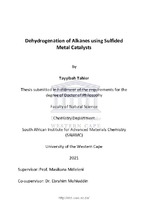| dc.contributor.advisor | Mdleleni, Masikana | |
| dc.contributor.author | Tahier, Tayyibah | |
| dc.date.accessioned | 2022-01-25T08:19:25Z | |
| dc.date.issued | 2021 | |
| dc.identifier.uri | http://hdl.handle.net/11394/8649 | |
| dc.description | Philosophiae Doctor - PhD | en_US |
| dc.description.abstract | Light olefins are some of the main raw materials for the petrochemical industry. With the rise in oil prices and increasing demand for olefins, there is an increasing interest in finding cheaper alternatives for processes in the petrochemical industry (PETROSA 2017). Research into the dehydrogenation of light alkanes has received significant attention. This dehydrogenation process represents a route to obtain olefins from inexpensive hydrocarbon feedstocks. The use of inexpensive hydrocarbons as a feedstock in the petrochemical industry could reduce the dependence on oil. Commercially used catalysts based on chromium or platinum have major disadvantages, including the harmful effects of chromium and the high cost of platinum, which limit their application to a certain extent. Therefore, research into developing efficient dehydrogenation systems using environmentally friendly and inexpensive metals have become highly desirable. Sulfide-containing metal catalysts have gained significant research interest for use in the dehydrogenation process and display interesting catalytic activity. | en_US |
| dc.language.iso | en | en_US |
| dc.publisher | University of Western Cape | en_US |
| dc.subject | Alkanes | en_US |
| dc.subject | Chemistry | en_US |
| dc.subject | Oil consumption | en_US |
| dc.subject | Oil prices | en_US |
| dc.title | Dehydrogenation of alkanes using sulfided metal catalysts | en_US |
| dc.rights.holder | University of Western Cape | en_US |
| dc.description.embargo | 2024 | |

